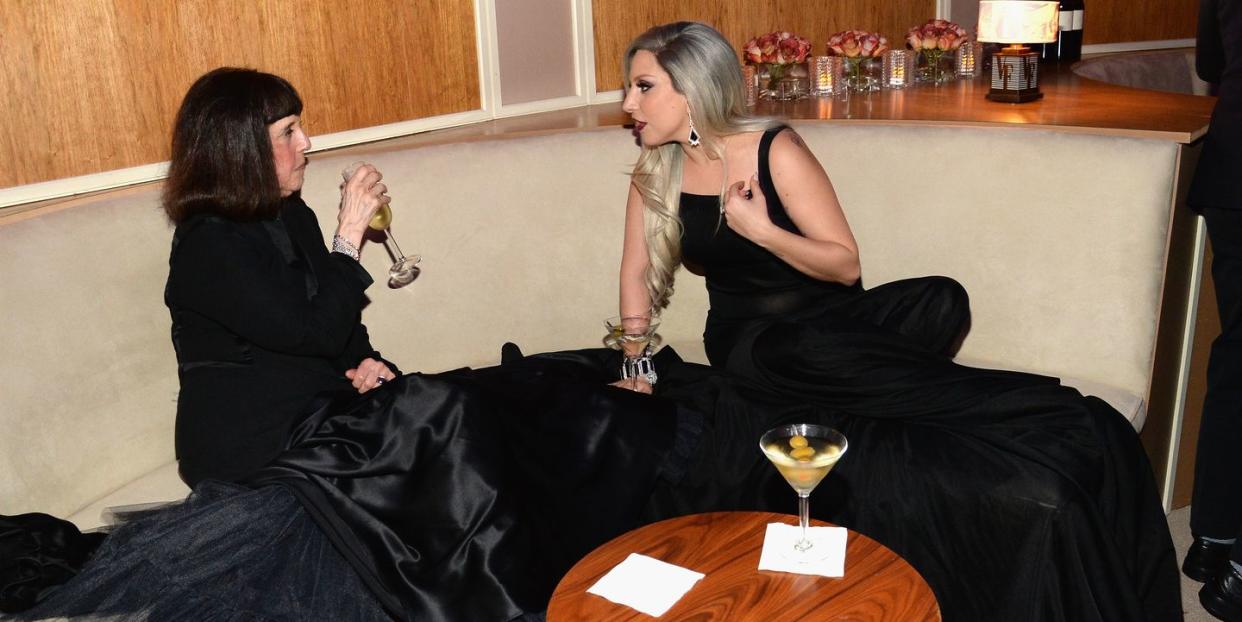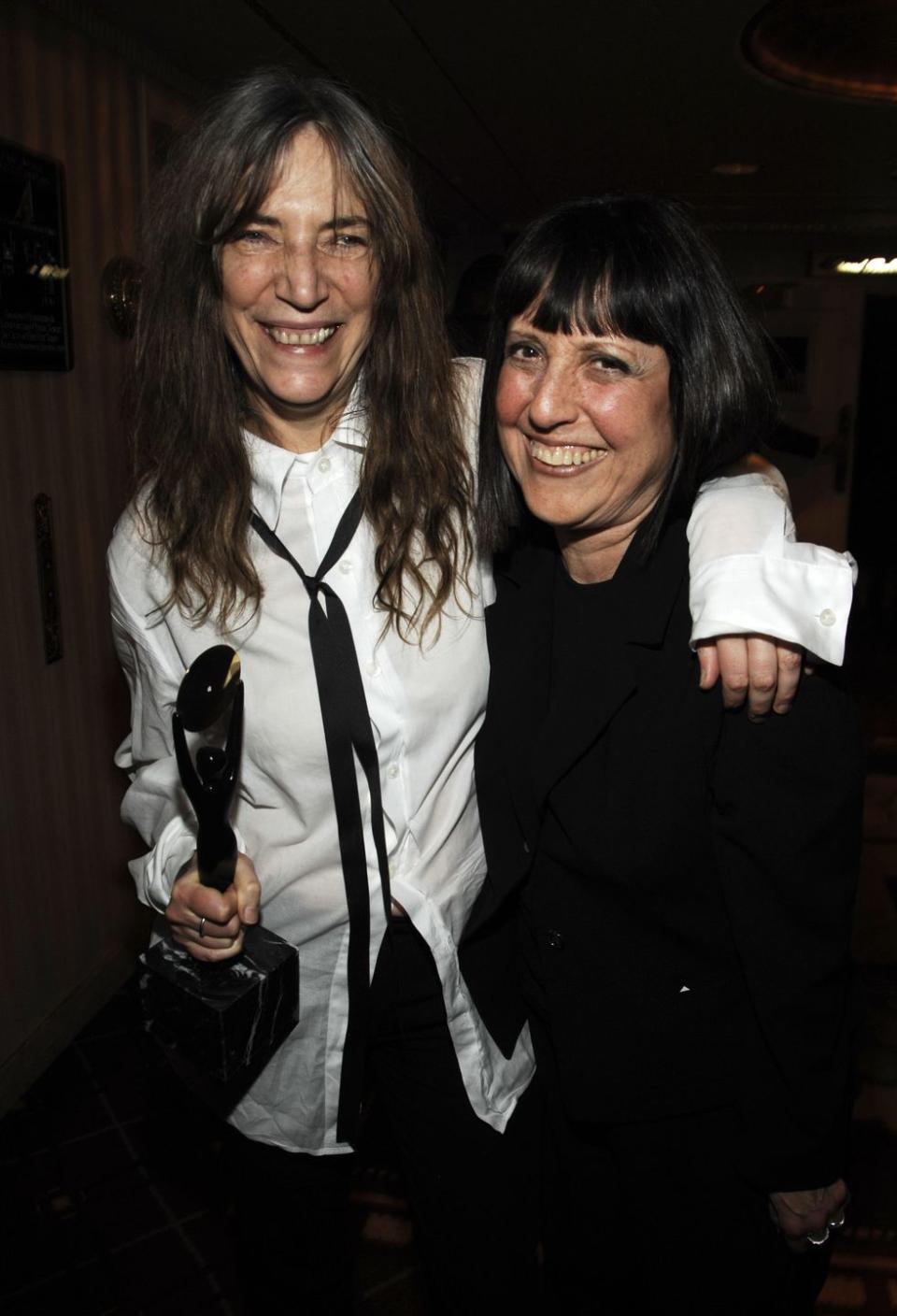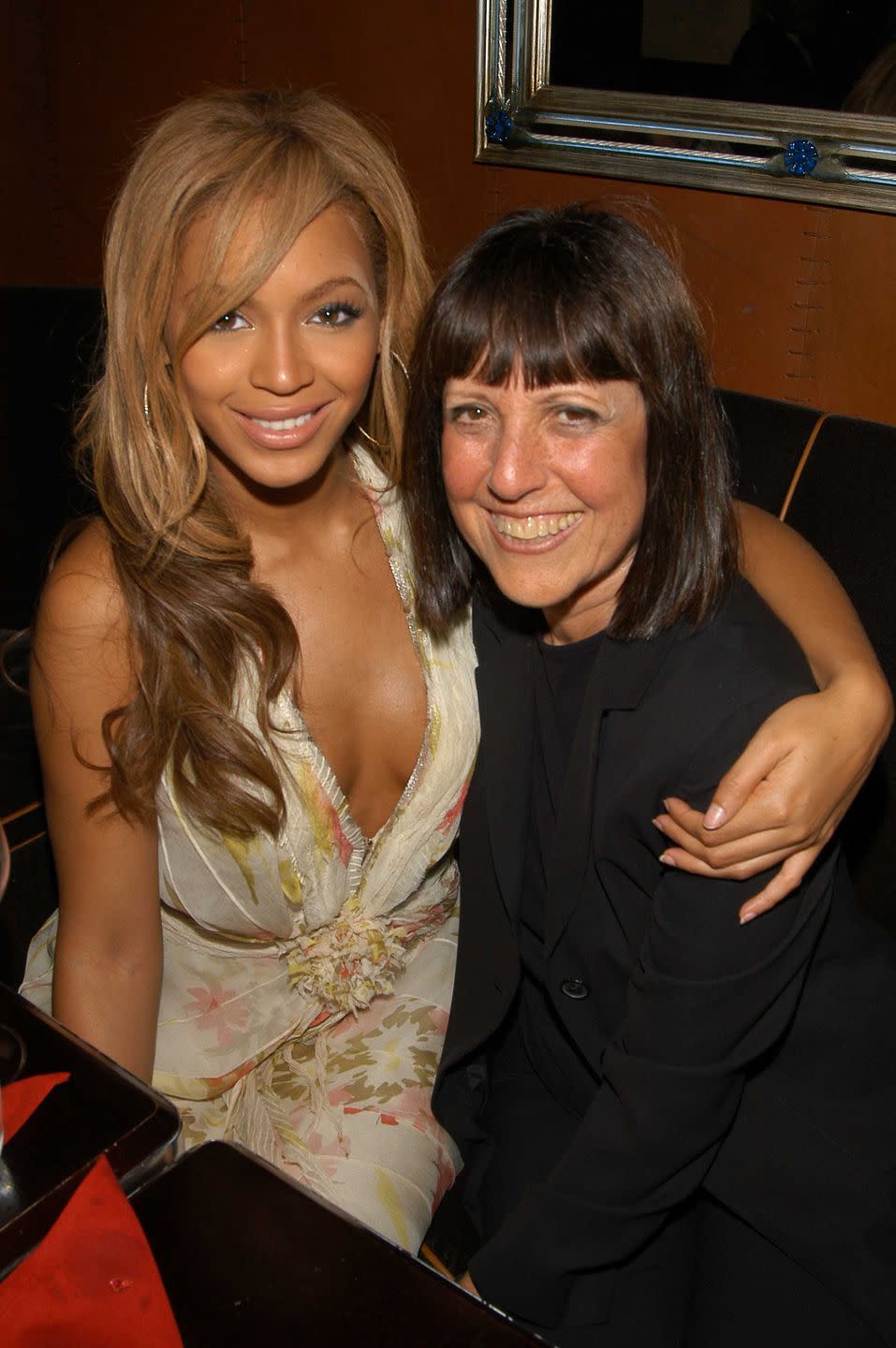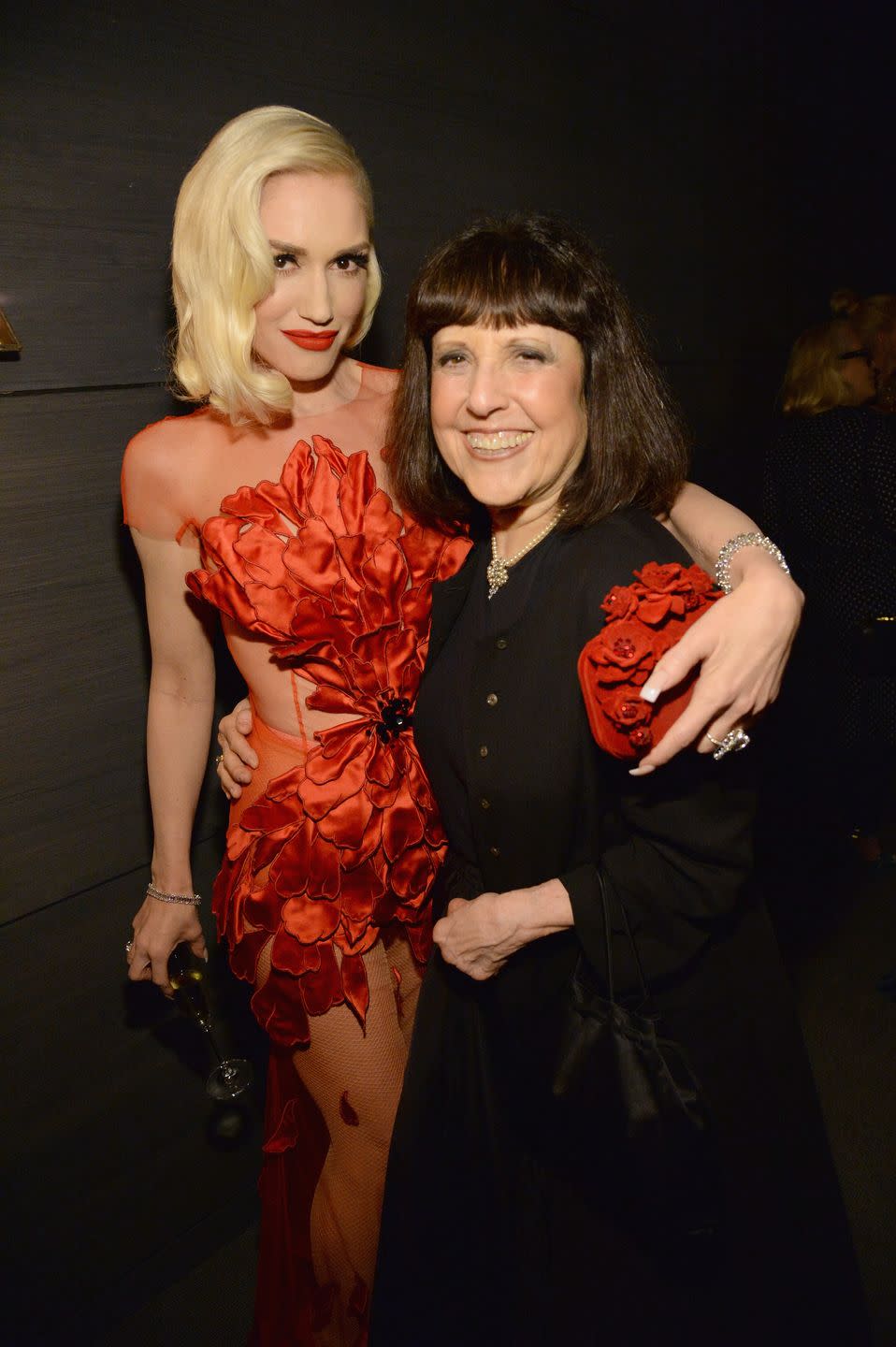How Writer Lisa Robinson Got the Biggest Women in Music to Let Their Guard Down

- Oops!Something went wrong.Please try again later.
Inimitable journalist Lisa Robinson has spent decades interviewing the most legendary artists on the planet. Prince, Mick Jagger, David Bowie, Jay-Z. She’s toured alongside them and stood backstage as they played to hundreds of thousands of adoring fans. She’s written countless cover stories for Vanity Fair magazine and her own memoir, There Goes Gravity, to boot.
Along the way, there were other interviews too. Beyoncé, Adele, Rihanna, Tina Turner, Joni Mitchell. But throughout the last 48 years of her storied career, Robinson noticed that inquiring minds seeking rock star fodder were mostly looking for juicy stories about her encounters with the men, not the women.
And so was born her latest book, Nobody Ever Asked Me About the Girls, a compilation—and clear labor of love—of interviews with more than 40 of the most prominent women in music, including the aforementioned performers. It’s a raw, insightful, and powerful look into the lives, loves, and hardships of so many iconic women. Broken down by themes, it covers everything from Love and Marriage to Hair and Makeup, Sex and Drugs to Family and Business. “I couldn’t write a chapter on every woman I’ve ever interviewed,” Robinson says. “It would have been an encyclopedia.”
A forever fan of music, the writer began her career with a little help from her late husband, Richard Robinson, who wrote a syndicated column for the now-defunct London newspaper Disc & Music Echo. By the early ’70s, he got bored, Lisa took over, Led Zeppelin took note of her work, and the rest was history. “He actually opened the door,” she says of her husband. “And I barged through it.”
Robinson’s greatest skill is her ability to converse simply, on the most basic of human levels, with the most famous people on earth. It’s both jarring and disarming. She says because she never did drugs, wasn’t a heavy drinker (wine and champagne were her vices), and was newly married (“My husband was much cuter than them,” she says matter-of-factly), she was trusted instantly. She connected easily and found common ground always; it’s what has allowed her to be on the receiving end of the most intimate and honest anecdotes from even the most famously private musicians.
We spoke last month about the bonds she forged with her female subjects, her various behind-the-scenes stories from the music world, and why she decided now was the time for this book. It’s clear that the performers she writes about were not the only pioneers in music; so, too, was Lisa Robinson. Here, highlights from our chat.
In the last few years, there’s been a sort of reckoning in the entertainment industry. Why this book now? Why was it important to you to do this?
I always had a feeling in the back of my head that I wanted to write about women, but I didn't know when. And I was busy writing the last book, and doing other work, and the last book had a chapter on Zeppelin and a chapter on the [Rolling] Stones. "There Goes Gravity" was the title. That was from an Eminem song, "Lose Yourself," and it won the Oscar. And a chapter on Eminem, a chapter on Bowie, and New York, and that whole CBGB scene. And only one chapter on a woman, which was Lady Gaga, because right at the time I was writing that book, I had done a couple of interviews with her, and I was totally fascinated by her. So after I did that, I thought, "Jesus, but this is ridiculous. I have thousands of women I've interviewed."
I had to limit it to 40 or so for this book, because I couldn't write a chapter on every woman I've ever interviewed. It would have been an encyclopedia. So what I did was, I broke it into these themes. You know, Hair and Makeup, Abuse, Love and Marriage, Sex, Drugs, Family, Business, Age, Stage Fright, Bad Reviews. And I took what were, I thought, the best stories of the interviews that I did, that would go with those themes. And I just wanted to write about women, and this was even before Me Too. When Me Too happened, I thought, I've got to do this.

You have women like Courtney Love and Tina Turner who are really divulging secrets and dark traumas to you. How does one gain trust in that way?
Well, it was the same thing as I said about the guys. I never was reviewing them. So by the time I met a lot of them, I already had this reputation, whether it was with Zeppelin, or with the Stones, that people knew I could be trusted. If somebody told me something was off the record, it was off the record. To this day. I love when they call you the next day, and they say, "Listen, you know that thing I said, could you take that out?" I interviewed Rihanna, and she never would have done this … but I interviewed Rihanna, and she talked incredibly freely to me, more about Chris Brown than I had read, that she said. And then, the next day, I got a phone call …"Rihanna, for the first time, loved this interview so much, she wants to give you extra time."
I said, "Oh, thank you, that's such a compliment, I loved her. She's fantastic, but I don't need any extra time." Because, first of all, I had almost three and a half to four hours of our conversation. We closed the private room in Giorgio Baldi. And I got so much information from her that I was always nervous—the next day, they'll tell you, "Oh, can I recant this, can I recant that?" So, that's one thing I learned.
I got this trust, I think, because I just talk to people. We were having conversations. We were two women, really discussing similar themes. We were talking about men. We were talking about the treatment of business people. We were talking about the male bosses. We'd all experienced the same things. I realized after talking, whether it was Tina Turner, or Dusty Springfield back in the day, or Stevie Nicks, or Joni Mitchell—all these rich, famous women have the same problems that we all have.
Right.
Seriously. I mean, yes, they have more money, and, yes, they're famous, but that doesn't mean that they haven't had hideous experiences. That they didn't have real problems with relationships. Especially when these women get famous, they have real problems having boyfriends or husbands, especially if they're more famous than the boyfriend or the husband. There are tremendous incidents in this book, where, whether it's Gaga saying every time she sold 10 more million records, she lost another boyfriend, or when she got an Oscar nomination, she lost another boyfriend. Or when Bonnie Raitt told me she was married and everybody thought of her husband, even though he was an actor, they all called him Mr. Bonnie Raitt. Gwen Stefani couldn't keep her marriage together. Her husband was screwing the nanny. And, you know, this all just kept happening. And the men who were involved were married men, who kept thinking they wouldn't leave their wife for them. And they went through that.
And I just related to so much of this, because I've heard this from so many girlfriends of mine, friends of mine, and I've been through a lot of the same things too. Toxic work atmosphere, underpaid, undervalued, underutilized; and until women run everything, I just think it's always going to be that way. Even the women who are now running companies, or magazines, or streaming services, or cable television channels, they're still not paid the same way men are. And they're still not regarded the same way. I mean, every woman is in a big hurry all of a sudden to hire women, or to hire women of color, but it's still not equal. I mean, look at Congress.
And even, by the way, with hip-hop, which is the largest-selling music [in the U.S.]. The stars are 10 percent female. So granted, they are very visible, whether it's Cardi, or Lizzo, or Megan Thee Stallion, or Summer Walker, or Jorja Smith—you know, all the women I couldn't get to put in this book, because I finished the book before they all started ascending. They're really visible. But there's not many of them at all.
I don't know if it started with Madonna, and the MTV of it all, but you write in the book about how so many women are also brands now. When did the shift begin?
I hate this whole concept of branding, because I just think that it kind of marginalizes people. It's like if you don't look good enough, or you don't have a perfume line, or you don't have a sneaker line, nobody's listening to your music. And I grew up at a time, before MTV, when you could just close your eyes, listen to a song, and imagine what it sounds like. Instead of being hit over the head and being told. In my "Hair & Makeup" chapter, I go into great detail about how I feel MTV changed everything. Because all of a sudden, you got stylists instead of style. I mean, Janis Joplin, to me, had way more style, just intrinsically, than Madonna did, with a team of stylists, or the people that she imitated, who were the girls from Eighth Street. She was considered some incredible, visual, great, sexual rebel, and I'm very clear in the book about how I'm not a fan.
Yes, you are quite clear.
And I've never been a real fan of pop stars. I've always been a fan of music, especially very soulful music. When Beyoncé was in Destiny's Child, I was not really a fan of Destiny's Child. When she went solo, and I started to get to know her … I don't even think she could have envisioned the evolution into the woman she's become.
When I would be in a room with her, she would hum something. We were in Barcelona once doing a photo shoot, and we had a boom box. But we were listening to Michael Jackson, Off the Wall, which I really thought was a better album than Thriller, and she agreed. And I started hearing her singing along to the songs, and I couldn't believe how amazing her voice was. Just there, in this park, in Barcelona, singing along to Michael Jackson, and she was just in a joyous, fabulous mood. She was on her way to vacation with Jay-Z, and I couldn't write that at the time, because even though they were dating, and people knew they were dating, they really weren't public. And so I didn't write about it, but she was so excited and looking forward to it. I heard her sing that song, "Love on Top," which is a more R&B song and I said to her, "My God, you could really do Gospel, and you could do any kind of style of music." And Jay said to me, also, "She'll never sell what's already been recorded. She's really a student of today. And the thing is, to me, that is much more interesting than the clothing line. That is much more interesting to me than somebody who burst onto the scene in the '80s on MTV, doing this sort of teeny little voice and very derivative look.

But what it did to women was, it did start making everybody have to worry about what they looked like. Whereas, prior to that … people knew what Mama Cass looked like, because The Mamas & the Papas were on television, and she was heavy, and there were pictures in magazines. But it didn't matter, because she sounded so great. Once MTV started … I mean, Stevie Nicks looked amazing, with those sort of witch-like looks and flowy dresses that she still wears now. She still looks amazing, but there's always a time where it's still in there, when you're talking about a woman in her 70s. And I just think that there are certain women who won't do that, that never want to do that.
Stevie Nicks does brand herself. I don't think Lorde will—we'll see what happens with her. But she told me—and I wrote about this in the book—at the age of 16, she'd direct, going into record executive company meetings and shooting down million-dollar ideas, because she said, she just knew what 16-year-olds would want to listen to, and she wasn't interested in the other stuff. Björk is still like that. Sade is still like that. I mean, there are still women who just don't care about branding themselves.
It's interesting. My friends and I were listening to Joni in seventh grade. If I'm in the car, I'm listening to Crosby, Stills & Nash.
I mean, you can get interested in something, because you have to for your job, and then actually, you could find out that you really like it.
Let me tell you something about when I saw Joni last year. There's a picture in the book. She was in a wheelchair, and I went up to her and I said, "How are you?" And she was totally deadpan, and she said, "I've been better." And she had been through two years of not being able to walk or talk, she had a horrible stroke, but we were able to gossip and just chitchat about the stuff that she told me about Laurel Canyon. She said the women of song did not get along, and she told me all these behind-the-scenes stories about how mean Joan Baez was to her.
And then, Stevie Nicks talked to me about how Joni was the major influence of her life. ... Lizzo talked to me about having one record when she was young, and Joni Mitchell had one record, and everybody wasn't so busy entertaining themselves all the time.
And then, I went to the opening night at the film festival of Martin Scorsese's Rolling Thunder Revue, and it's Bob Dylan, and it's T Bone Burnett, and it's Allen Ginsberg, and all these people from a tour in 1974. Joni Mitchell arrived late for the tour, and she wrote a song about it called "Coyote." And you see a scene, where she's showing Dylan this song, and he's looking at her, trying to figure out her fingerings and her tunings on the guitar. And I remember her telling me of when she used to sit around in Laurel Canyon, and they'd all pass the guitar around, and no one would pass it to her. That she would have to ask for it. They'd listen to Bob Dylan records, and everyone would cheer and applaud him a little. And then, she would play chords for the Dead song.
So, I'm at this film festival, and this movie is playing, and you see the scene of Bob Dylan looking at her, when she's playing this song, and the fingerings, and he's looking at her, like, trying to figure it out. And at the end of that song ... the entire place stood up and gave it a standing ovation. It was the only thing in the entire two-and-a-half-hour movie that got that standing ovation. And that's today, from that audience. I called her the next day to tell her, because I was so blown away by it. So, when something's really good, it just lasts.
Over the years, was there a woman in particular you felt you connected with especially?
I can't possibly pick one. I'm serious. It would be an incomplete list. Even with five, it would be an incomplete list. I mean, because I've talked to hundreds of them, whether it's Romy Madley Croft in the xx, or Gaga, who absolutely was one of the most candid women I ever talked to. Or Rihanna, again, open, elegant, smart, lovely. You know, Beyoncé, at the beginning, was guarded, but then, as we got to know each other more, she was way more open. Now she's going back to being guarded again and not doing interviews.
Within five minutes, Adele was talking to me about postpartum depression, and it was clear to me that she wanted to talk about it. She wanted to talk about it to a woman. … I just was always interested in people, and I always had a good connection with anyone I was interviewing, male or female. With women, it's easier, because I'm a woman, they're women; we had a lot of the same problems.
Also, with someone like Gaga, for example, when I first met her, she said, "I can't ... You knew Freddie Mercury, you know David Bowie. Tell me, what was John Lennon like?" So my reputation kind of preceded me. A lot of these women wanted to know my stories, and that totally broke the ice.

What would you hope the reader takes away from this book? Was there a message you wanted to relay, or did you just want to tell your stories?
I don't know that there's a message, but I think an overview of it would be, all these rich and famous women have the same problems that we all do. So even if you're not a big music fan, I think it's interesting to share some of the problems that Beyoncé went through, some of the problems Lady Gaga went through. Or 10 years that Adele went through before everybody heard of her. You know, these things just don't happen overnight. Everybody has a struggle. But especially for anybody who's a fan of any female musician, I think these are stories that take you really backstage. Really behind the curtain.
I'm starting a Sirius radio show in January, where I'm just going to take phone calls, where people can ask me questions. That I can sort of gossip about backstage stories. That's what I think this book is, really. It's a lot about me and stuff I went through in relation to these themes.
This interview has been edited and condensed for clarity.
You Might Also Like

